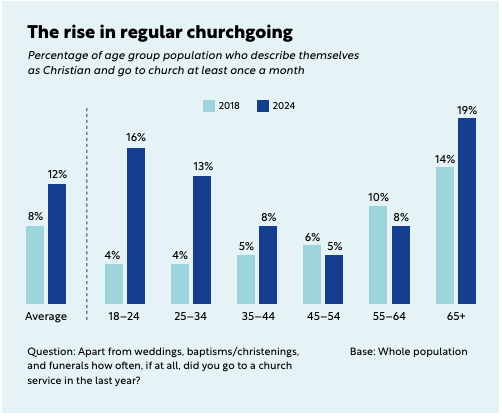A remarkable resurgence of religious engagement is unfolding across England and Wales, with new data from the Bible Society revealing a 50% increase in overall church attendance over the past six years. The share of the population attending church at least once a month has risen from 8% in 2018 to 12% in 2024, driven largely by a surprising wave of young adults returning to the pews in search of community and meaning.
The most striking growth is among 18-24-year-olds, where monthly church attendance has quadrupled from 4% in 2018 to 16% in 2024, according to a chart shared by researcher Ryan Burge on X. This dramatic shift signals a potential spiritual revival among Gen Z, a generation often characterized by digital immersion and skepticism toward traditional institutions. The 25-34 age group also shows significant growth, with attendance rising from 4% to 13% over the same period, reflecting a broader trend among Millennials and Gen Z re-engaging with Christian practices.
Older age groups report more modest increases: 35-44-year-olds rose from 5% to 8%, 45-54-year-olds from 6% to 9%, and 55-64-year-olds from 8% to 10%. Those over 65 saw a slight uptick from 14% to 19%, remaining the most consistent churchgoers but no longer the sole drivers of attendance.
This resurgence marks a stark contrast to decades of declining church attendance in the UK. A 2023 Anglican Mainstream report noted a 20% drop in Anglican service attendance between 2000 and 2006, part of a broader historical shift away from organized religion. The Church of England alone closed 1,500 churches between 1969 and 2002, according to a 2022 Wikipedia report. Yet, the Bible Society’s findings suggest a move from nominal to active Christian identity, particularly among young adults grappling with social and economic uncertainties like the UK’s cost-of-living crisis, which has intensified since 2022.
Dr. Rhiannon McAleer, co-author of the Bible Society report, attributes the trend to a longing for connection. “Young people are searching for meaning in a post-pandemic world marked by isolation and digital fatigue,” she said. The data aligns with a 2024 Premier Christian News study, which found that 69% of 18-24-year-olds in the UK believe faith significantly impacts their lives, compared to just 51% of those over 65.
Denominational shifts are also evident, with Catholicism gaining ground among 18-34-year-olds at 41% of churchgoers in 2024, up from 30% in 2018, while Anglican attendance in this group dropped to 20%. Immigration does not fully explain the trend, as the increase holds true among white-only samples, with 18% of 18-34-year-old white men attending monthly in 2024, up from 3% in 2018.
The revival coincides with cultural pushback against secularization, amplified by social media platforms like TikTok, where #ChurchTok videos have garnered over 50 million views in 2024. However, experts caution that while the increase is notable, it follows years of steep decline, and the long-term trajectory of organized religion in the UK remains uncertain. The Bible Society’s survey, conducted by YouGov with 13,146 respondents, has sparked renewed discussions about the role of faith in modern British society.
